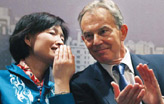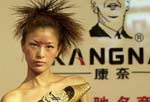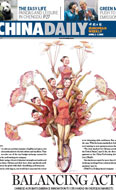Economy
PMI rise indicates more growth
Updated: 2011-04-02 09:28
By Chen Jia (China Daily)
|
 |
|
Overseas visitors talk with Chinese textile manufacturers at a trade fair held earlier in Beijing this year. For industries such as electronics, textiles and nonferrous metals, the Purchasing Managers' Index rose above 60. [Photo / China Daily] |
Expansion looks set to continue as index rises to 53.4 in March
BEIJING - The official Purchasing Managers' Index (PMI) increased to 53.4 in March from 52.2 in February.
The official increase was shadowed by a PMI report from HSBC released on Friday, which rose slightly to 51.8 in March. The figures indicate that the world's second-largest economy may continue to expand at a rapid pace this year, and avoid the risk of a "hard landing", analysts said.
The official PMI rebounded from February's six-month low, according to the China Federation of Logistics and Purchasing on Friday. The March figure is the first gain after three consecutive months of decline since December. A PMI reading above 50 indicates expansion, while one below 50 suggests contraction.
The output sub-index, one of the five component indicators of PMI, climbed to 55.7 in March from 53.8 the month before, the National Bureau of Statistics (NBS) said in a statement on Friday. For industries such as electronics, textiles and nonferrous metals, the figure rose above 60.
The rising output sub-index suggests that domestic industrial production has rebounded from February, when economic activity was affected by China's seven-day Lunar New Year holiday, according to the NBS.
"The rebound eases concern about a slowdown risk for the world's fastest-growing major economy," said Lu Yanjin, a senior analyst from Industrial Securities Co Ltd. Year-on-year economic growth in the first quarter could reach 9.5 percent, and is likely to maintain a rapid pace in the first half of the year.
The input price component of the PMI, which gauges major purchasing prices for producers and acts as an indicator of inflationary pressure, moderated to 68.3 from February's 70.1. Given the moderation of the sub-index, inflationary pressures have eased slightly, said Nomura Securities Co. China's consumer inflation rose to 4.9 percent in February, unchanged from January, but up from 4.6 percent in December.
China has taken a number of steps to control inflation, including the imposition of price controls on general goods and an increase in price support for grain producers. These measures have been complemented by greater control of real estate prices, interest rate increases, rises in the reserve requirements for banks and greater flexibility for yuan appreciation.
Inflationary pressure may continue, as the escalation of unrest in North Africa could result in a further rise in the price of oil, said Maria Malas-Mroueh, an economist at London-based Fitch Ratings Inc.
However, Yi Gang, vice-governor of the People's Bank of China, said last week that he was confident inflation would be kept at about 4 percent, the government's target.
The March PMI figures also indicate that a "hard-landing" for the Chinese economy can be ruled out. The growth in urban fixed-asset investment will continue to bolster the economy in the first year of the 12th Five-year Plan (2011-2015), said Nomura.
China's "economic growth is only moderating rather than slowing too much," said Qu Hongbin, HSBC's chief economist in China. "More importantly, the rate at which prices are rising has also started to slow."
"These factors confirm our view that quantitative tightening is working. As long as Beijing keeps tightening for another three to four months, inflation should start to slow meaningfully in the second half of 2011," he said.
E-paper

Green mission
Tony blair believes China will take a leading role to fight climate change and cut emissions.
Stepping on to success
French connection
Generation gaps
Specials

Have you any wool?
The new stars of Chinese animation are edging out old childhood icons like Mickey Mouse and Hello Kitty.

Fill dad's shoes
Daughter and son are beginning to take over the family business of making shoes.

Virtual memorial
High-Tech touches to traditional tombsweeping festival help environment.




